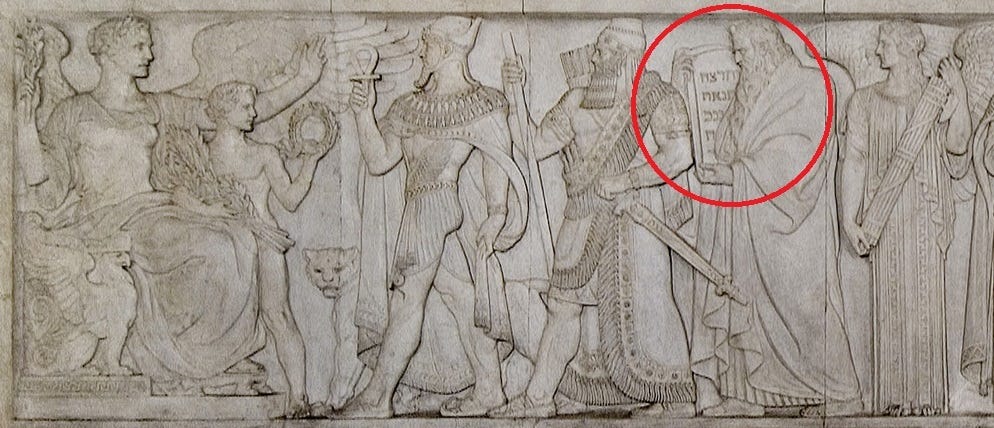Louisiana Mandates Ten Commandments In Every Classroom For 'History'
But what if your religion is stare decisis?
I AM the Lord thy God. Thou shalt have no other gods before me. Thou shalt not make to thyself any graven images. Thou shalt not take the Name of the Lord thy God in vain. Remember the Sabbath day, to keep it holy. Honor thy father and thy mother, that thy days may be long upon the land which the Lord thy God giveth thee. Thou shalt not kill. Thou shalt not commit adultery. Thou shalt not steal. Thou shalt not bear false witness against thy neighbor. Thou shalt not covet thy neighbor's house. Thou shalt not covet thy neighbor's wife, nor his manservant, nor his maidservant, nor his cattle, nor anything that is thy neighbor's.
On June 19, 2024, Louisiana Gov. Jeff Landry signed HB71 into law, requiring all public schools in Louisiana to display the Protestant version of the Ten Commandments in every classroom in the state, from preschool to PhD. No deviation is permitted, and educators may not swap in versions favored by Catholics or Jews. Nor are schools or teachers free to use even another translation of the Protestant text. And despite the fact that Gov. Landry is Catholic, like roughly a third of his Christian constituents, the law requires the they use ye olde English from the King James Bible, which Catholics do not use.
Schools must display those exact words in every classroom “on a poster or framed document that is at least eleven inches by fourteen inches,” with the text “the central focus of the poster” and “printed in a large, easily readable font.”
In addition to specifying what public schools must say, HB71 also specifies what those schools can’t say. A school or teacher could not, for example, decide to display copies of Thomas Jefferson’s Letter to the Danbury Baptists (building a “wall of separation between Church and State”) alongside the Ten Commandments, or worse, a copy of the Treaty of Tripoli, Article 11 of which says that “the government of the United States of America is not in any sense founded on the Christian Religion.”
Schools may not even display a copy of the Constitution itself, since it contains that pesky Bill of Rights that starts off with the words “Congress shall make no law respecting an establishment of religion,” and emblazoning “I AM the Lord thy God” might seem a little establishment-y.
Rather, the only documents that subsection 4(a) expressly permits a public school to display are “the Mayflower Compact, the Declaration of Independence, and the Northwest Ordinance … along with the Ten Commandments.” While those are important documents in American history, specifying only those three seems a bit limiting — until one realizes that those are three of the most religious-sounding of our nation’s founding documents. (Although even these are not particularly religious in nature, given that the United States is a secular nation.)
The Declaration of Independence contains two references to “the Laws of Nature and Nature’s God” and states that “men… are endowed by their Creator with certain unalienable rights.” The Northwest Ordinance opines that “religion, morality, and knowledge” are “necessary to good government.” And the Mayflower Compact of 1620, predating the Constitution and the First Amendment by nearly two centuries, identifies its signatories as subjects of “Sovereign Lord King James, by the Grace of God” and establishes New Plymouth as being founded for the “Advancement of the Christian Faith.”
In addition to circumscribing what may appear alongside the Protestant Ten Commandments, Subsection 5 mandates that public schools and teachers may not create any such displays themselves, but “shall” either “accept donated funds to purchase the displays” or “accept donated displays.” Which outside groups would be assembling and donating displays prominently featuring the Protestant version of the Ten Commandments is left as an exercise for the reader.
There is nothing new under the sun — Ecclesiastes 1:9
Or, as the Louisiana-mandated King James version puts it, “The thing that hath been, it is that which shall be; and that which is done is that which shall be done: and there is no new thing under the sun.”
In 1980, the state of Kentucky passed an identical law, requiring the display of the Ten Commandments in public school classrooms. It even had the same private donations language and a mandate that the commandments be large and in charge in every classroom, although the Kentucky did not require any particular sect’s version to be displayed.




